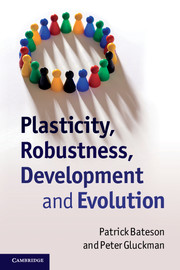Book contents
- Frontmatter
- Contents
- Preface
- Acknowledgements
- 1 Setting the scene
- 2 Clarifications
- 3 Developmental robustness
- 4 Plasticity
- 5 Integration of robustness and plasticity
- 6 Current function of integrated developmental processes
- 7 Evolution of developmental processes
- 8 Impact of developmental processes on evolution
- 9 Development and evolution intertwined
- References
- Index
Preface
Published online by Cambridge University Press: 05 August 2011
- Frontmatter
- Contents
- Preface
- Acknowledgements
- 1 Setting the scene
- 2 Clarifications
- 3 Developmental robustness
- 4 Plasticity
- 5 Integration of robustness and plasticity
- 6 Current function of integrated developmental processes
- 7 Evolution of developmental processes
- 8 Impact of developmental processes on evolution
- 9 Development and evolution intertwined
- References
- Index
Summary
‘Nobody reads books these days.’ Such was the unhelpful advice of one of our colleagues. So why have we written one? Our answer is that, in many areas of biology and psychology, advances in what is known have not been matched by advances in what is understood. This is particularly true when questions about developmental origins are raised in biology and psychology. All too often such debates are reduced to whether a particular feature of an individual is due to nature or nurture. Many scientists in the fields of both biology and psychology have an interest in either development or evolution, or both. Similarly, many practitioners of human and veterinary medicine also wish to have a much clearer understanding of the debate about developmental origins, as do many biological anthropologists and philosophers of biology. This book was written for those who have become dissatisfied with the way in which these debates are conducted.
Biology can show us many wonders, but one of the most remarkable is how a complex organism grows from almost nothing – a tiny seed or a microscopic embryo. Until recently, the processes that are involved seemed beyond understanding and, even now, much remains to be discovered. Nevertheless, the factual certainties have been known for a long time. An egg taken from a hen's nest and incubated artificially does not hatch out as a different species from its mother. Its characteristics were latent from the moment its mother's egg was fertilised by its father's sperm.
- Type
- Chapter
- Information
- Plasticity, Robustness, Development and Evolution , pp. vi - viiPublisher: Cambridge University PressPrint publication year: 2011

